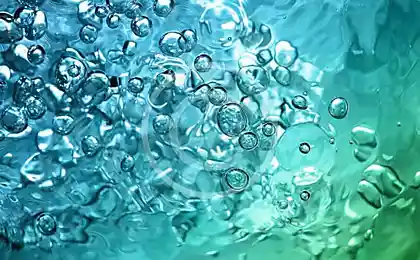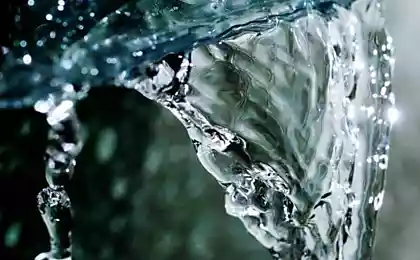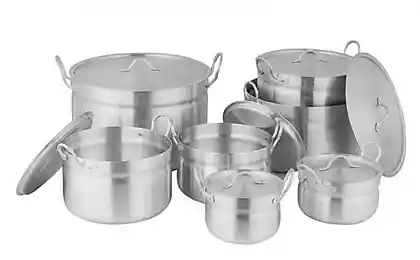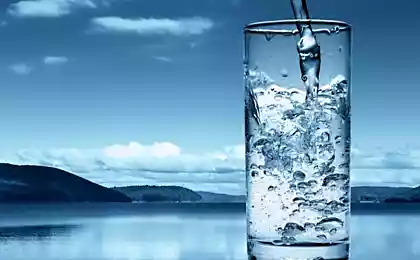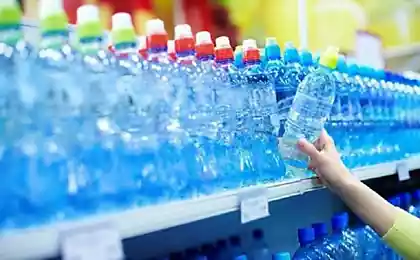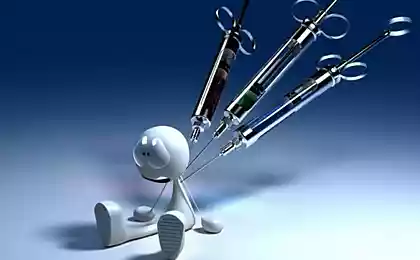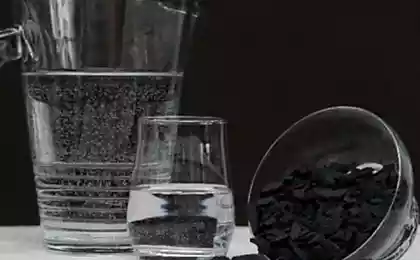565
Drinking water known producers was a threat to the health
Drinking water known producers was a threat to the health, the website of the Roskontrol. Sales of bottled water in Russia are growing every year. Many people buy bottled water not only in hot weather on the street, but for everyday use at home. How not to be mistaken with a choice? Experts Roskontrol chose 12 popular brands of drinking and mineral water at the price from 20 to 150 rubles for a half liter and conducted laboratory tests to learn what water is safe and of high quality.
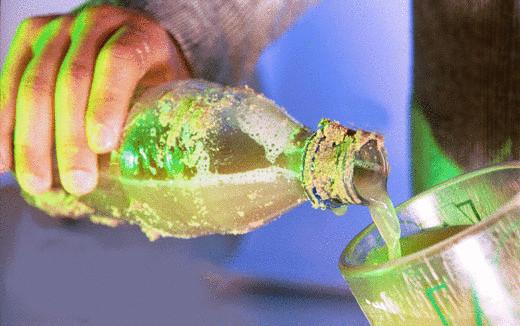
For examination were purchased bottled water "Shishkin Les", Bonaqua, "Holy source" Evian, "Lipetsk pump room", Cristaline, Vittel, "Just Azbuka", Nestle Pure Life, Aparan, Aqua Minerale, "D (Dixie)".
Security
At the first stage of the research, experts were faced with an unpleasant surprise. The most important indicator of safe drinking water — the content of microorganisms. In the water, "Just Azbuka", which is made in the Stavropol region on the order of trading networks "Azbuka Vkusa", the number of microbes in 70 times higher than the allowable standard.
Also this indicator is recognized as unsafe water Aparan (Armenia), it microorganisms 3.5 times more than the norm.
This level of microbial contamination indicates a General disadvantage of the source of water supply. This means that in the next batch of water, "Just Azbuka" or Aparan can easily be dysentery Bacillus, Salmonella and other dangerous microorganisms and viruses. For failing the safety requirements of the above brands of water included in the "black list" Roskontrol.
In Aparan in addition to bacteria, the nitrates — they are two times more than the norm. Comprehensive indicator of toxicity (sum of nitrate and nitrite) in 40 times exceeded expensive French water Cristaline.
Nitrites enter the source water from wastewater and are an indicator of the so-called "organic pollution". Most likely, the water taken in areas located near industrial enterprises, municipal wastewater treatment facilities, farms or of farms, and the water obviously lies on the surface or at shallow depth (experts use the term "horizons, are insufficiently protected from penetration of water from runoff").
For reference:
Nitrates — salts of nitric acid, the element of mineral fertilizers. Are present in water, vegetables, fruits. Thresholds they themselves are safe, but in the body (and in soil) they can turn into nitrites.
Nitrites in large quantities are toxic and carcinogenic. Drinking water with a high content of nitrites is dangerous because they disrupt the ability of blood to carry oxygen, in fact, is a poison to the hemoglobin. Transformed into nitrosamines, they can cause cancer.
The experts identified several indicators of water pollution — the content of ammonium ions and permanganate oxidation. Exceeding the standards for these indicators suggests that the water could get gasoline, kerosene, phenols, pesticides and other harmful substances. The results of tests of the security requirements do not correspond to the brand Bonaqua and "Holy spring" and the water is Cristaline, although safe, but does not meet the heightened requirements declared by the manufacturer, which marked her as a water of the highest category.
How could this happen? Why even the water that says "artesian", and numbers of wells is contaminated? Did the producers do not have to cleanse?
Rufina Mikhailova, PhD, head of the laboratory of hygiene of drinking water and sanitary protection of waters, research Institute of human ecology and environmental hygiene named after A. N. Sasina:
"Any water before packaging is at the stage of preparation. Technologies of water purification are many – depending on the source water quality. The only requirement for disinfection of water intended for bottling should not be used chlorine. If the water is initially close to perfect, and exceeded the figures for only some of the elements are used simple filters.
The most common technology "reverse osmosis". It allows to obtain a sterile, perfectly clean water, special membrane filters trap all the impurities, ensuring stable quality of purified water. But there is an opposite effect, unfortunately, too careful cleaning, water deprived not only harmful, but also nutrients. In its properties, this water is approaching distilled".
All water samples were also tested for the content of toxic elements — mercury, lead, arsenic, aluminum and other: none water not exceeding content of these substances.
Quality
The value of drinking water is determined by micro and macro elements, only about 50 substances. For humans there is a physiological norm for the quantity and composition of dissolved mineral salts in the water. Almost all the labels of bottled water set the total level of mineralization. From the point of view daily water consumption, can be considered an optimum level of 200-500 mg/l of drinking water a person can get up to 20% of the daily dose of calcium, 25% magnesium, up to 50-80% of fluorine, up to 50% iodine.
Examination showed that calcium and magnesium are almost none in the water "Shishkin Les" and "Aqua Minerale", the lack of fluoride in the water Bonaqua, "Holy spring", "Lipetsk pump room" and even in an expensive water Evian and Vittel. With the constant use of such water there is a shortage of relevant substances in the body. Recall that the lack of fluoride causes tooth decay, calcium — osteoporosis and reduced bone density (and, consequently, a tendency to fractures, and in children — a violation of the formation of the skeleton), magnesium — problems with the heart and nervous system.
In the water "Shishkin Les" exceeded the content of bicarbonate, according to this indicator, the water does not meet the first category stated on the label.
According to doctors, consumption of water with high content of bicarbonate is not recommended for people suffering from chronic kidney disease, including stone formation, as well as people with reduced secretion of gastric juice.
Safe according to the results of our tests recognized water Evian, Vittel, Nestle Pure Life, Aqua Minerale, "D" (Dixie) and "Lipetsk pump room". The optimal composition (content of minerals and trace elements) — drinking water "D" (Dixie). She also, incidentally, the cheapest of the tested samples.
The most delicious tasting parties seemed water "Lipetsk pump room" (which lacks useful elements) and the French water Evian and Vittel (in which calcium and magnesium are in sufficient quantity, while fluorine is not at all).
Why is it so important to the quality of drinking water? What would happen if you constantly drink water in which some minerals are not enough, while others too much?
Irina Konohova, a leading expert NP "Roskontrol" doctor:
"The systematic use of drinking water, mineral composition of which differs from the optimum, increases the predisposition to various diseases. Reaction the same – he was trying to excess or to compensate for the shortage by drawing water with the necessary salts available in the body. Drinking enough hard water (where no calcium and magnesium) is associated with increased morbidity diseases of the circulatory system.
Therefore, it is important to comply with water standards on indicators of mineral composition, to provide the physiological usefulness of water for the body to work without stress, not getting rid of the excess and without reducing the amount of water by excreting salt. To do this, all the main indicators of drinking water quality needs to be at optimal levels: total salinity, hardness, trace elements content. Such water is called physiologically full. It is this water – the most useful, and it can and should be drunk every day both adults and children."
Source: greencityreview.ru/

For examination were purchased bottled water "Shishkin Les", Bonaqua, "Holy source" Evian, "Lipetsk pump room", Cristaline, Vittel, "Just Azbuka", Nestle Pure Life, Aparan, Aqua Minerale, "D (Dixie)".
Security
At the first stage of the research, experts were faced with an unpleasant surprise. The most important indicator of safe drinking water — the content of microorganisms. In the water, "Just Azbuka", which is made in the Stavropol region on the order of trading networks "Azbuka Vkusa", the number of microbes in 70 times higher than the allowable standard.
Also this indicator is recognized as unsafe water Aparan (Armenia), it microorganisms 3.5 times more than the norm.
This level of microbial contamination indicates a General disadvantage of the source of water supply. This means that in the next batch of water, "Just Azbuka" or Aparan can easily be dysentery Bacillus, Salmonella and other dangerous microorganisms and viruses. For failing the safety requirements of the above brands of water included in the "black list" Roskontrol.
In Aparan in addition to bacteria, the nitrates — they are two times more than the norm. Comprehensive indicator of toxicity (sum of nitrate and nitrite) in 40 times exceeded expensive French water Cristaline.
Nitrites enter the source water from wastewater and are an indicator of the so-called "organic pollution". Most likely, the water taken in areas located near industrial enterprises, municipal wastewater treatment facilities, farms or of farms, and the water obviously lies on the surface or at shallow depth (experts use the term "horizons, are insufficiently protected from penetration of water from runoff").
For reference:
Nitrates — salts of nitric acid, the element of mineral fertilizers. Are present in water, vegetables, fruits. Thresholds they themselves are safe, but in the body (and in soil) they can turn into nitrites.
Nitrites in large quantities are toxic and carcinogenic. Drinking water with a high content of nitrites is dangerous because they disrupt the ability of blood to carry oxygen, in fact, is a poison to the hemoglobin. Transformed into nitrosamines, they can cause cancer.
The experts identified several indicators of water pollution — the content of ammonium ions and permanganate oxidation. Exceeding the standards for these indicators suggests that the water could get gasoline, kerosene, phenols, pesticides and other harmful substances. The results of tests of the security requirements do not correspond to the brand Bonaqua and "Holy spring" and the water is Cristaline, although safe, but does not meet the heightened requirements declared by the manufacturer, which marked her as a water of the highest category.
How could this happen? Why even the water that says "artesian", and numbers of wells is contaminated? Did the producers do not have to cleanse?
Rufina Mikhailova, PhD, head of the laboratory of hygiene of drinking water and sanitary protection of waters, research Institute of human ecology and environmental hygiene named after A. N. Sasina:
"Any water before packaging is at the stage of preparation. Technologies of water purification are many – depending on the source water quality. The only requirement for disinfection of water intended for bottling should not be used chlorine. If the water is initially close to perfect, and exceeded the figures for only some of the elements are used simple filters.
The most common technology "reverse osmosis". It allows to obtain a sterile, perfectly clean water, special membrane filters trap all the impurities, ensuring stable quality of purified water. But there is an opposite effect, unfortunately, too careful cleaning, water deprived not only harmful, but also nutrients. In its properties, this water is approaching distilled".
All water samples were also tested for the content of toxic elements — mercury, lead, arsenic, aluminum and other: none water not exceeding content of these substances.
Quality
The value of drinking water is determined by micro and macro elements, only about 50 substances. For humans there is a physiological norm for the quantity and composition of dissolved mineral salts in the water. Almost all the labels of bottled water set the total level of mineralization. From the point of view daily water consumption, can be considered an optimum level of 200-500 mg/l of drinking water a person can get up to 20% of the daily dose of calcium, 25% magnesium, up to 50-80% of fluorine, up to 50% iodine.
Examination showed that calcium and magnesium are almost none in the water "Shishkin Les" and "Aqua Minerale", the lack of fluoride in the water Bonaqua, "Holy spring", "Lipetsk pump room" and even in an expensive water Evian and Vittel. With the constant use of such water there is a shortage of relevant substances in the body. Recall that the lack of fluoride causes tooth decay, calcium — osteoporosis and reduced bone density (and, consequently, a tendency to fractures, and in children — a violation of the formation of the skeleton), magnesium — problems with the heart and nervous system.
In the water "Shishkin Les" exceeded the content of bicarbonate, according to this indicator, the water does not meet the first category stated on the label.
According to doctors, consumption of water with high content of bicarbonate is not recommended for people suffering from chronic kidney disease, including stone formation, as well as people with reduced secretion of gastric juice.
Safe according to the results of our tests recognized water Evian, Vittel, Nestle Pure Life, Aqua Minerale, "D" (Dixie) and "Lipetsk pump room". The optimal composition (content of minerals and trace elements) — drinking water "D" (Dixie). She also, incidentally, the cheapest of the tested samples.
The most delicious tasting parties seemed water "Lipetsk pump room" (which lacks useful elements) and the French water Evian and Vittel (in which calcium and magnesium are in sufficient quantity, while fluorine is not at all).
Why is it so important to the quality of drinking water? What would happen if you constantly drink water in which some minerals are not enough, while others too much?
Irina Konohova, a leading expert NP "Roskontrol" doctor:
"The systematic use of drinking water, mineral composition of which differs from the optimum, increases the predisposition to various diseases. Reaction the same – he was trying to excess or to compensate for the shortage by drawing water with the necessary salts available in the body. Drinking enough hard water (where no calcium and magnesium) is associated with increased morbidity diseases of the circulatory system.
Therefore, it is important to comply with water standards on indicators of mineral composition, to provide the physiological usefulness of water for the body to work without stress, not getting rid of the excess and without reducing the amount of water by excreting salt. To do this, all the main indicators of drinking water quality needs to be at optimal levels: total salinity, hardness, trace elements content. Such water is called physiologically full. It is this water – the most useful, and it can and should be drunk every day both adults and children."
Source: greencityreview.ru/
Digital alarm clock on the water
Terrible photo report - cells for the mentally ill on the island of Bali
